Day-by-Day Celebration For Chinese New Year
Home > China Travel Special Report > Chinese New Year- The Year of Rooster > Chinese New Year Celebration
When is Chinese New Year?
| Year | Begins | Animal Sign |
|---|---|---|
| 2017 | Jan. 28 | Rooster |
| 2018 | Feb. 16 | Dog |
People in Chinese usaully celebrates the Chinese new year for 16 days, from the Chinese new year's eve to the 15th day of Chinese new year - the lantern festival. The following is a detailed introduction of the day-by-day celebration of Chinese new year.
Chinese New Year Eve: Family's reunion dinner
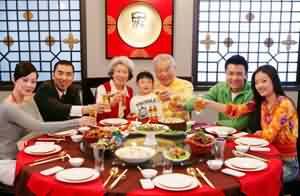
Chinese New Year’s Eve, which falls on the last day of a year according to Chinese lunar calendar, is called "Chu Xi" in Chinese. Having a history of 2000 years or so, it is one of the most important festivals in China.
At Chinese New Year's Eve, families usually get together according to the traditional custom. People can drop their work and other things that bother them, and indulge themselves in beer and skittles. The northern part of China and southern part of China have different ways to celebrate this day; for example, people in the north eat dumplings at this eve while people in the south eat “Nian Gao” (meaning Year Cake). In the northern part of China, people will put a coin in one dumpling when making dumpling and the one who, by chance, eat this dumpling will have good luck in the coming year. The shape of a dumpling is like a gold ingot, and the pronunciation of Nian Gao in Chinese means “keeping promoting to a higher position”. Both of them are signs of good luck and happiness. However, there are also some customs they have in common. At that eve, all the members of the family gather to enjoy a reunion dinner. There is an essential dish on the table, namely, fish, because fish in Chinese means prosperous and harvest. It is a symbol of fortune and luck in the future year. In terms of the reunion dinner, there is a small regional difference: people in the north are used to having this dinner at home while people in the south like to have this dinner at a restaurant. So, tips: if you want to celebrate the Chinese New Year’s Eve in the southern part of China, make sure you make a reservation in a restaurant ahead of time; or every restaurant will be full.
The happiest moment is when elder members of the family give red envelopes to children as a Lunar New Year gift. Then, they will paste couplets of the Spring Festival, “Happiness” posters (sometimes they paste the poster up side down which means “the happiness is coming” in Chinese), New Year pictures and even some paper-cutting. After that, families will close the front door, until they welcome the God of Fortune in the morning of Chinese New Year.
During the whole night, all family members should stay up to watch in the New Year. Children like to go out and set off firecrackers. However, adults usually stay at home, chatting, playing cards, playing Mahjong and enjoying the reunion moments. Since 1982 when the CCTV New Year’s Gala was first broadcast four hours before the beginning of the New Year, watching the CCTV New Year’s Gala has become an important event in Chinese New Year’s Eve.
Customs to celebrate Chinese New Year’s Eve are much the same all over China. Nevertheless, there are some different and interesting customs in some regions. For example, instead of eating dumplings and New Year cakes, people in Sichuan enjoy hotpot, and Zhaoqin people usually have Zong Zi (traditional Chinese rice-pudding).
Day 1: celebrates the beginning of a year
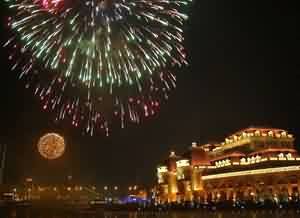
Chinese New Year is the beginning of a year, and the beginning of spring as well. The celebration of Chinese New Year can be traced back to more than 1000 years ago. Officially beginning at the midnight, this day is to welcome the gods of heaven and earth.
In the morning of Spring Festival, families will first set off some firecrackers before they go out according to the traditional customs. It is believed that the crackles of the firecrackers can drive out evil spirits. Besides, the red color of firecrackers also symbolizes good luck in traditional Chinese culture.
On this first day of the Chinese New Year, the most important thing for everyone to do is to visit the older and more senior members of their extended families, mostly their parents, grandparents, great-grandparents and so on. Usually, people pay a visit to their houses in person. The younger generation kowtows and bows to the elder generation, and wishes them a happy new year.
This is a longstanding tradition in China which began in Han Dynasty (206 B.C. – 220 A.D.). Now, with the development of the society, people also pay visits to their relatives, friends and neighbors. And thanks to the advance of science and technology, making a ceremonial call on Chinese New Year instead of paying a visit in person is becoming more and more popular. This can save a lot of time and energy.
Day 2: visiting friends and relatives
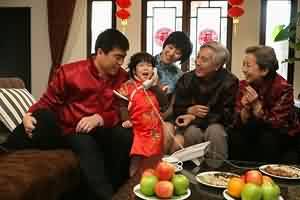
The second day of the Chinese New Year is also known as “Kai Nian” in Chinese, meaning the beginning of a year. On this day, shops, businessmen and even ordinary families will offer sacrifices to the God of Fortune who they welcomed in the Chinese New Year’s Eve. They hop the God of Fortune can give them a great fortune in the coming year. The five main sacrifices the big shops in Beijing offer include a whole pig, a whole lamp, a whole cock, a whole duck, and a live red carp.
In addition, the second day of the Chinese New Year is also commonly referred to as “Ying Xu Ri” in Chinese, meaning the day to welcome sons-in-law. That is because on this day, married daughters will visit the parental home with their husband. They will bring some gifts and red envelopes for the children in their parents’ home. And according to the traditional customs, it is required that the daughters and sons-in-law should have lunch in their parents’ home. This custom provides a chance for sisters to get together, and talk about their old happy days and their everyday life. In some places, families usually take a photo of their families on this day.
Day 3: staying at home
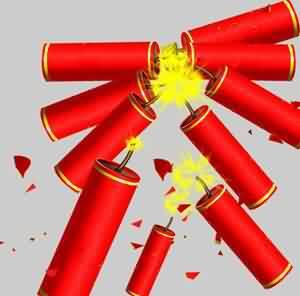
On the third day of the Chinese New Year, people usually don’t go out for visiting, because this day is believed to be “Chi Kou Ri” (the day of red mouth). It is generally accepted that this day is not a good day to socialize or visit relatives and friends, because “red mouth” in Chinese culture is easy to cause quarrels and fights. This day is also known as “Chi Gou Ri” (the day of Red Dog). The Red Dog is the God of Blazing Wrath. Bad things will happen if people run into the Red Dog. So, on this day, older people who believe in superstition will stay at home all day long.
The third day of the Chinese New Year is an ominous day, so there are many other things people are forbidden to do according to the traditional custom. For example, on this day, people are not allowed to clean the house, make a fire, draw water and so on. In some regions, people are also forbidden to eat rice because they believe this can lead to reduction of rice’s and other crops’ output. However, with time progress, fewer and fewer people believe in the superstition. More and more people take this day as a precious opportunity for family reunion.
Day 4: worshiping gods

The fourth day of the Chinese New Year is quite an auspicious day. This day is commonly referred to as “Yang Ri”(the Day of Goat), and goat is a symbol of good luck in Chinese culture.
The fourth day of the Chinese New Year is the day to welcome the kitchen god, the god of fortune and other gods. Families should stay at home to prepare abundant fruits, burn incense and light candles to welcome the gods. The sacrifices provided to the god of fortune should include goat head and carp.
On the fourth day of the Chinese New Year, families can finally clean their house. They collect all the rubbish to one place and throw them all, which symbolize that they throw away all the bad luck and possible poverty of this year. And in some rural areas in North China, people will light a fire on a stick and throw the stick into a river to put off the fire. This shows that there will not be any fire disaster in this family in the whole year.
This day is the last day that shops are closed. In the midnight of this day and before the dawn of the fifth day of the Chinese New Year, all businesses will return to normal.
Day 5: festival of po wu, and many taboos can be broken on this day
The fifth day of the Chinese New Year is commonly known as the Festival of Po Wu (“Po” means breaking). According to the traditional customs, it is believed that many taboos can be broken on this day, and this is why this day is the Festival of Po Wu. From this day on, women can be freely to drop around and shops will return to normal on this day.
There are several stories about the origin of the Festival of Po Wu, among which the most popular one is that this day is the birthday of the god of fortune. So, on this day, people will celebrate this day with a large banquet. They will also shoot off firecrackers in the attempt to get the attention of the god of fortune, thus ensuring his favor and good fortune for the whole new year.
In the northern part of China, people eat dumplings on this day to celebrate that many taboos can be broken since this day. Besides, the shape of a dumpling is like a gold ingot, so eating dumplings is also a way to celebrate the birthday of the god of fortune.
Day 6: sending away the ghost of poverty
The sixth day of the Chinese New Year is also known as “Ma Ri” (the day of horse). According to traditional customs, families usually send away the ghost of poverty on this day. Different regions in China have different ways to send away the ghost of poverty, their wishes are the same, which is to send sway poverty in the past and welcome the beautiful days in a new year.
According to the legend, the ghost of poverty is a son of Zhuan Xu (an emperor among the Three Emperor and Five Sovereigns in ancient China). He was short and weak, and liked wearing ragged clothes and eating poor porridge. Even when people presented him with new clothes, he would not wear it until he ripped it apart or burn it. So, he got the name of “the man of poverty”, and with time passing by, he gradually became the ghost of poverty.
So, how to send away the ghost of poverty? Usually, people will throw away their ragged clothes, rubbish and other dirty things. In addition, they will also light some candles to lighten the road for the ghost of poverty. Last but not least, families should clean their toilets because the god of toilets will come to check the sanitation of the toilets.
Day 7: the day of human
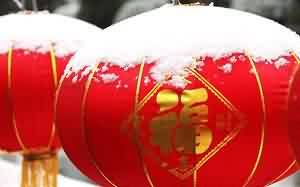
The seventh day of the Chinese New Year is commonly referred to as “Ren Ri” (the day of human), because according to the legend, Nv Wa ( a Goddess in Chinese mythology who is believed to create the world and human beings) created human beings on the seventh day. On this day, people have different ways to celebrate the creation of human beings.
People in some regions will eat Qi Bao Geng (a thick soup of seven kinds of vegetables, and the variety of the vegetables differs in different places) on this day. In ancient times, some ladies and scholars would go for a spring outing on this day. There are many poems of the scholars about the spring outing on this day has been spread up to now. In most part of China, people will have noodles on this day, because noodles symbolize longevity in Chinese culture. In some rural places of Shandong Province, people also send away fire disasters on this day. They make torches with straws of crops, light the torch and send the torch out of the village. This is to express their wishes that there will not be any fire disasters in the new year.
Day 8: celebrating the birthday of millet
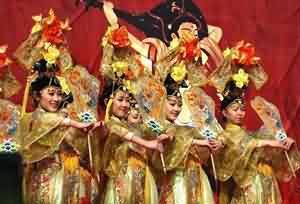
The eighth day of the Chinese New Year is believed to be the birthday of millet, an important crop in ancient China. According to the folk proverbs, if this day is bright and clear, then this whole year will be a harvest year; however, if this day is cloudy or even rainy, then the whole year will suffer from poor harvest.
Although millet is no longer among the staple food in China, the celebration of this day is still of great significance. The aim of this day, which is to attach importance to agriculture and cherish food, still matters today. This is especially important to children to form a good habit to cherish food. So, on this day, parents can take their children to the villages or the fields, and introduce some basic agricultural knowledge to the children. They can also encourage their children to take part in the cultivating of the crops, which can help children experience the difficulty of agriculture work. After going back home, parents can ask their children to make a supper with the grains with their own hands. This can help children know the preciousness of food. In some regions, families free captive animals on this day.
Day 9: the birthday of Jade Emperor, the supreme Deity of Taoism
The ninth day of the Chinese New Year is the birthday of the Jade Emperor (the Supreme Deity of Taoism). According to Taoist legend, all the deities of the heaven and the earth will celebrate this day. And there will be grand ceremonies in Taoist temples on this day.
Ordinary families also have their own way to celebrate the birthday of the Jade Emperor. Beginning from the midnight of the eighth day of the Chinese New Year to 4 o’clock before the dawn of the ninth day, people will keep setting off firecrackers.
So, how to celebrate this day? On this day, people usually offer sacrifices to the Jade Emperor. Before the sacrifice, the whole family will take a shower first, to show their respect to the Jade Emperor. On this day, families should not hang our wet clothes or dump the trash, because this is believed to be ominous. The sacrifice offered to the Jade Emperor should be a cock, rather than a hen. In some rural area North China, the traditional customs require people to take the statue of the Jade Emperor through the village. In the evening, young people will gather under a tree and sing lucky songs to celebrate the birthday of the Jade Emperor.
Day 10: the birthday of the god of stone
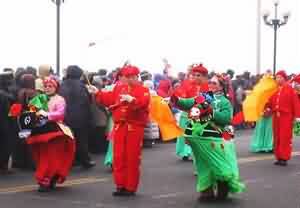
The tenth day of the Chinese New Year is the birthday of the god of stone. On this day, it is forbidden to move any stone, including stone roller, stone mill and stone mortar, so this day is also known as “Shi Bu Dong”(meaning not move any stone). In addition, it is also forbidden to cut into a mountain for rock and build a house with rocks, or bad things will happen to the crops. On this day, families will burn incense and candles for the stones, and offer pancake to the god of stone.
In the ancient times, the tenth day of the Chinese New Year is the day to celebrate the marriage of the mouse. According to the legends in the regions south of the Yangtze River , mouse is a harmful and unlucky animal, so people have to get the mouse married off to ensure a peaceful and lucky new year. On this day, families should not open any boxes or cabinets, and will go to bed early, in case that they may disturb the mice. Children will put some candies and peanuts in the corners of the house as the dowry for the mouse. New Year pictures and paper-cutting about the marriage of mice are popular among folk people in China.
Day 11: fathers-in-law to entertain sons-in-law
The eleventh day of the Chinese New Year is for fathers-in-law to entertain sons-in-law. There is a lot of food left on the ninth day of the Chinese New Year when celebrating the birthday of the Jade Emperor, so the left over of that day can be used to entertain the sons-in law.
In Binyang County, Guangxi Province, the eleventh day of the Chinese New Year is “Pao Long Jie” (the Dragon Dance Festival). The dancing dragon in Bingyang County is larger than dancing dragons in other places. It is about 40 meters long. The shorter dragons have 7 sections while the longer ones have 11 sections. On of the unique features of the dragon dance in Binyang is that the dragon dancing is accompanied by firecrackers along the streets.
The eleventh day of the Chinese New Year is also the day to welcome Zi Gu (the Purple Lady). According to the legend, Zi Gu was a concubine of a rich man in ancient China. The wife of the rich man killed her in the toilet due to her jealousy. The Heavenly God had compassion for her, so he made her the god of the toilet. Zi Gu represents all the females who groan under the oppression in the feudal society. So women worship her and regard her as the guardian angel of weak females.
Day 12: preparing for the lantern festival
The twelfth day of the Chinese New Year does not have much significance. From the Chinese New Year’s Eve to the eleventh day of the Chinese New Year, the food that people eat is mostly greasy and rich. So, from this day on, people start to take a light diet and moisturize dryheat by clearing the bowels.
Because it will be Lantern Festival three days later, so, preparing work should start on this day. Families will buy some lanterns and build the lantern shack.
In some places in Shijiazhuang, capital city of Hebei Province, the traditional custom is to make a fire with cypress branches. Then, people will sit around the fire to warm themselves. It is believed that cypress fire can drive out evil spirits and pestilence. Apart from cypress branch, people also burn the old furniture they no longer use. Some people even carve the burned cypress branch into the shape of a lock. Parents make a necklace with the lock carving and give it to babies to bless the babies. Children will not get any disease after they warm themselves by the fire. And old people can make a wish before the fire, wishing the heavenly god can give them a grandson.
Day 13: seeing lanterns
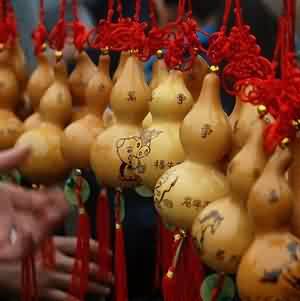
People in the northern part of China and people in the southern part of China take this day with entirely different attitudes.
In the northern part of China, the thirteenth day of the Chinese New Year is an ominous day. It is said that this day is the death anniversary sons of an old man—Mr. Yang. He had thirteen sons who all died in a row within one year. And the first son died on the thirteenth day of the Chinese New Year. So, this day became the death anniversary sons of Old Yang, and became an ominous day. On this day, it is not good for marriage, and people seldom go out on this day. In addition, large ceremonies will not choose this day either.
However, in the southern part of China, especially in Nantong City of Jiangsu Province. This day is the day to appreciate lanterns. On the thirteenth day of the Chinese New Year, people in an endless stream will go to town god's temple to appreciate lanterns. And this is only the prologue of the lantern show of Lantern Festival. There are also riddles written on some lanterns for people to guess, adding to happy atmosphere of the festival.
Day 14: celeration of lantern festival
To most parts of China, the fourteenth day of the Chinese New Year is all for the next day — Lantern Festival. On this day, the lantern fair is officially open for citizens to buy lanterns.
Performances like dragon dancing and lion dancing for Lantern Festival begin to practice in the streets. Families prepare lanterns, “Yuan Xiao” or “Tang Yuan” (rice glue balls) and some candles for the use of the next day.
In Shaoxing City, Zhejiang Province, local people will cook a soup on this day, namely “Liang Yan Tang” (soup good for one’s eyes). This soup aims to remained people of the end of the Chinese New Year. People have to brace their energy and get ready to works.
In Taizhou City, Zhejiang Province, local people make the fourteenth day of the Chinese New Year Lantern Festival. This is to memorize a revolt in Yuan Dynasty (1271 A.D. – 1368 A.D.). In Yuan Dynasty, the Han people were under the oppression of the Mongolian rulers. To free the Han people from the oppression and misery, some people in Taizhou revolted on the fourteenth day of the Chinese New Year. So, local people made this day the Lantern Festival to memorize them.
Day 15: celeration of lantern festival
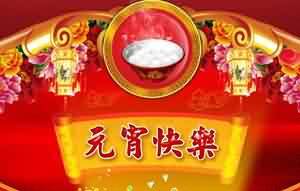
The fifteenth day of the Chinese New Year is also celebrated as Yuan Xiao Jie (Yuan Xiao is rice glue ball in English) or Shang Yuan Jie, or in English Lantern Festival. This is a major festival in China. And the activities of Chinese New Year will reach a high point on this day. Early on the morning of this day, there will be dragon dancing and lion dancing parades in the streets, and all the streets will be crowded with people. And the parades will last for nearly a whole morning and afternoon.
The happiest moment comes in the evening of this day. In the evening, people will light many colorful lanterns, and families will go out together to enjoy the glorious full moon. There are riddles on some lanterns for people to guess. In some places of China, people even fly Kongming Lantern, on which their beautiful wishes are written.
Lantern Festival, which provides an opportunity for young people to get acquainted, is also a romantic festival. In ancient times, young ladies are not allowed to go out freely except on some festivals. And with the beautiful full moon fancy lanterns, Lantern Festival is romantic enough for young ladies to meet their lovers.
Yuan Xiao (rice glue ball) is essential on Yuan Xiao Jie. Yuan Xiao is a kind of traditional food in China. It is a symbol of reunion in Chinese culture.
Spend a New Year in China
Spring Festival is the most important celebration of the year to nearly all Chinese people. During the festival, people use the color red, representing good luck, to show their happiness. If you join in the Best of China and Karst Landscape Tour during the spring festival period, you will see all the streets filled with lanterns and spring festival couplets. Taking a trip in China at Chinese New Year will be unforgettable.
In Beijing, whether in the Forbidden City or the hutongs, you can feel the happy New Year’s atmosphere, especially when you talk to locals. In Xi’an, the Ancient City Wall hosts a horde of hanging red lanterns. In Guilin and Yangshuo, you will see tourist attractions decorated with lucky ornaments. And in Shanghai, festival decorations can be found even on the electronic screens.




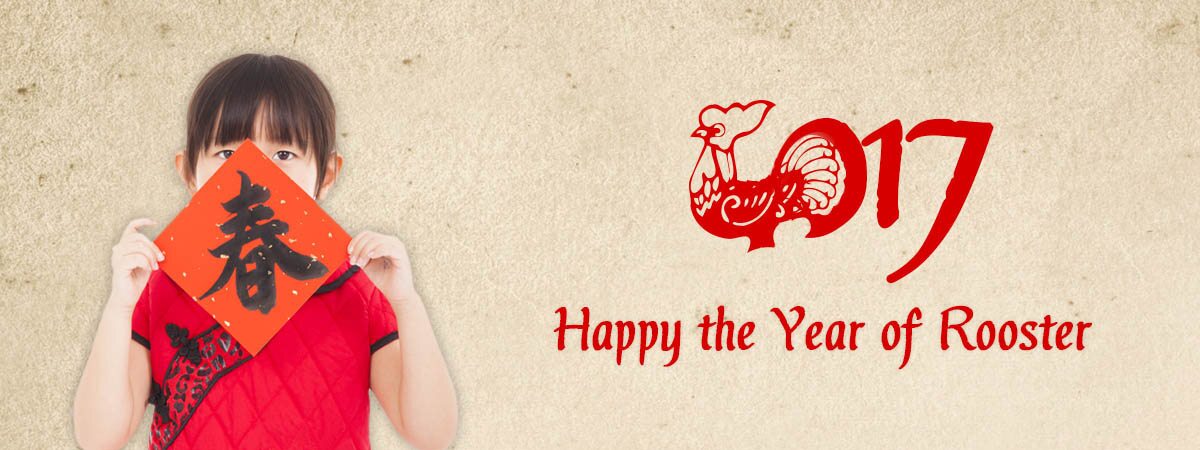

No comments:
Post a Comment
thank you we will revert soon